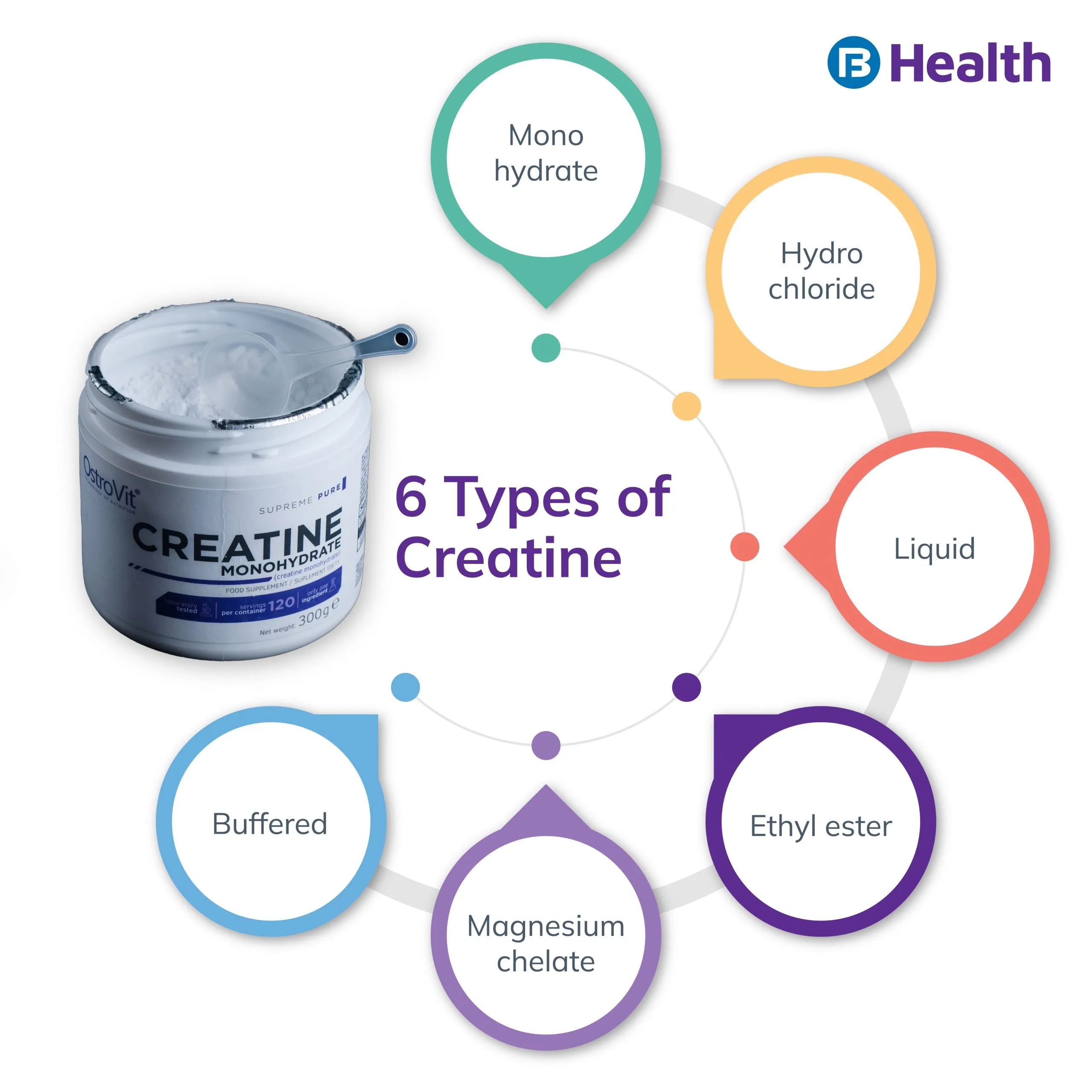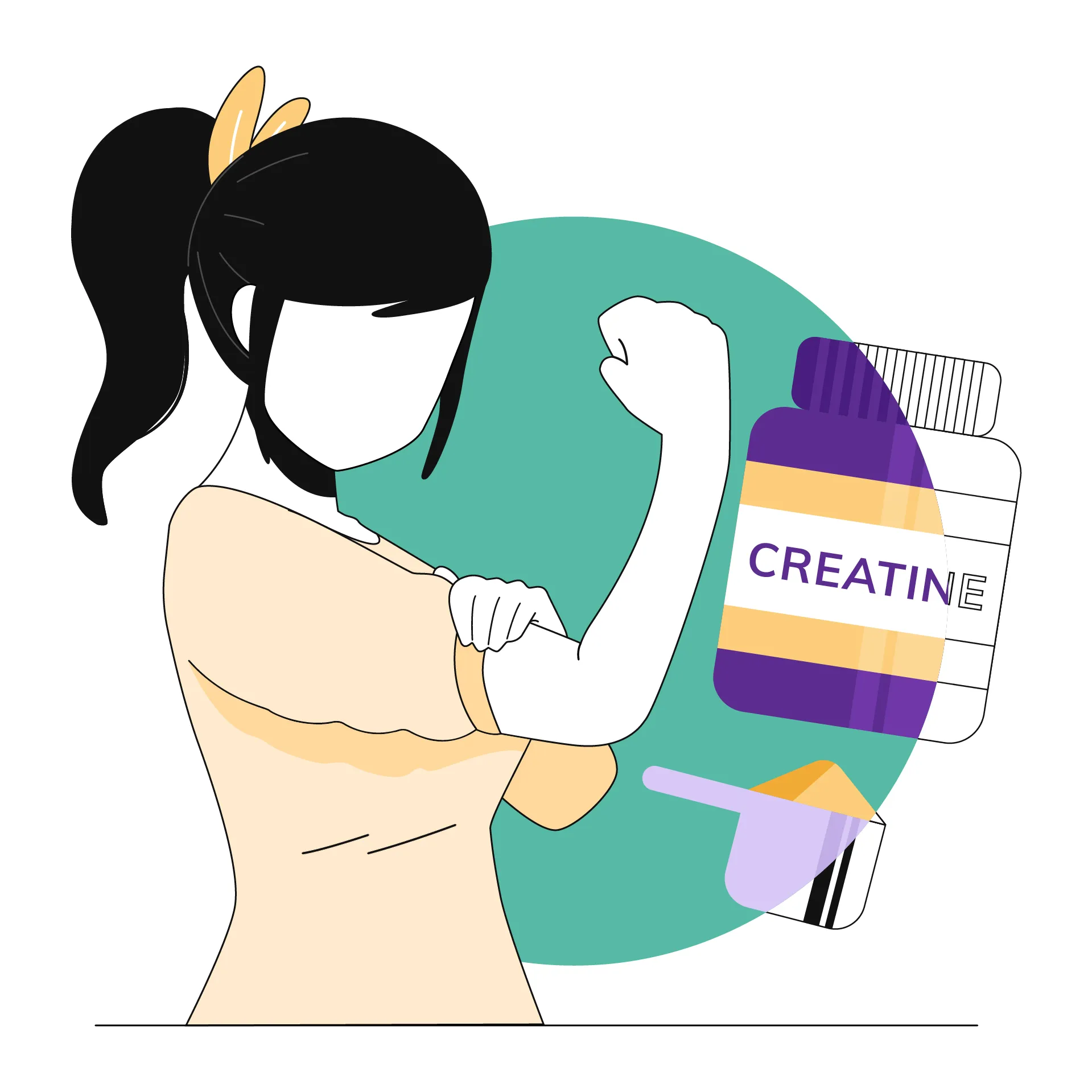Nutrition | 4 min read
Creatine Benefits: 5 Ways in Which Creatine Is Good For You
Medically reviewed by
Table of Content
Key Takeaways
- Improved performance during exercise is one of the popular creatine benefits
- Creatine supplement benefits include improved brain health and energy
- Creatine powder side effects include bloating, gas, dehydration, weight gain
Creatine benefits your health in more ways than one, but the most popular perk is its ability to improve strength and build muscles. One of the reasons why creatine benefits your health in this way is because it has similarities with amino acids. These similarities stem from their ability to provide energy. As a result, it is often used by athletes to improve their performance and strength.
There are two ways in which your body can get creatine – through your diet and from your kidneys and liver. Creatine supplement benefits your body in the same way and is relatively safe for consumption. Read on to know some of the top creatine benefits for your health.
Top 5 Creatine Benefits for Your Health
Helps Increase Energy Production
Creatine phosphate helps your body form adenosine triphosphate. ATP is one of the molecules that your cells use for basic functions, including energy production. When you consume creatine supplements, it results in an increase in the amount of creatine phosphate.
This increase also helps your performance during exercise because your body produces energy by breaking down ATP. Creatine supplement benefits your body in this case because it helps your body reproduce ATP at a quicker rate. A quicker reproduction of ATP results in you being able to perform consistently.
Additional Read: What is Epilepsy Seizure
Protects Brain Health
Phosphocreatine, also known as creatine phosphate, helps maintain ATP levels and stabilize the source of energy in your brain. A decline in this chemical can lead to several neurological conditions. Creatine supplements benefit your brain health by helping it fight against certain mental conditions [1].
These medical conditions include epilepsy, Parkinson’s, brain injury, ischemic stroke, spinal cord injury, or Alzheimer’s. Moreover, creatine benefits also include the positive impact it has on ASL [2].
Boosts Muscle Growth
Myostatin is a molecule that can inhibit muscle growth. Muscle growth is also one of the common creatine benefits. Studies suggest that creatine can help reduce the amount of myostatin. A decreased amount of myostatin enhances your body’s ability to build muscle faster [3].
Since creatine benefits also include improved performance, it also has a direct impact on your muscle growth. The reason why creatine supplements help in this way is that they increase the water content present. This increase then results in increased muscle size. Taking creatine supplements for a week can have positive and visible effects on your muscle size as well as your lean mass.
Lowers Blood Glucose Levels
According to research, people who consumed creatine supplements and exercised after a high-carb meal had better control of blood sugar levels than those who didn’t [4]. Glucose transporter type 4, also known as GLUT 4, brings blood glucose into your muscles. Creatine benefits you by managing blood sugar levels because it increases GLUT 4 function.
Apart from this, research also suggests that because of an increased function of GLUT 4, creatine supplement benefits also include managing type 2 diabetes [5]. When combined with exercise, creatine supplements help improve glycemic control in people with type 2 diabetes.
Diminishes Fatigue
Tiredness can be a result of various factors such as brain injury, sleep deprivation, heat, and more. Since increased ATP is one of the creatine benefits, it can help your brain fight fatigue. It is also said that creatine can help increase dopamine levels which has a positive impact on fatigue. Studies suggest that for sleep-deprived people, creatine benefits by reducing fatigue and increasing energy.
Additionally, people with a brain injury who took creatine supplement experiences reduced headaches, fatigue, and dizziness [6]. There is also research that suggests that creatine reduces muscle and mental fatigue in athletes during high heat exercises.
Additional Read: What Is SchizophreniaHelps with depression
In depression, the dopamine levels in your brain decrease. Creatine can improve dopamine levels, making it useful in treating depression.
Improves HIIT Performance
HIIT, or high-intensity interval training, requires a significant amount of energy. And creatine can boost HIIT performance as it directly affects the levels of ATP, which are the cell's energy currency. Increased ATP translates to more energy, allowing you to perform better during HIIT.
It may be helpful against neurological diseases
Several neurological diseases are due to lower levels of phosphocreatine. Therefore, creatine may help treat these neurological diseases as creatine increases phosphocreatine levels. In addition, research suggests that creatine is helpful for people who have ALS by improving motor function and reducing muscle loss.
Safe & Easy
Unlike other muscle-building supplements, creatine is quite safe.
Creatine dosage per day
Usually, people take creatine mixed with juice or water. You can take it before or after a workout. There are two dosage variations for creatine:
- Creatine Loading: This method aims to quickly load your cells with creatine for faster benefits by consuming 20-25 g of creatine every day
- Take 20-25 grams of creatine
- Split it into 4-5 parts
- Consume the parts throughout the day
- Maintenance Dose: This method is slower than creatine loading; you must only consume 3-5 g of creatine daily. The results start to show around 28 days after beginning creatine consumption.
Is creatine safe?
Creatine consumption has not been linked to any harm. Although the common opinion is that creatine is bad for kidneys, no study conclusively proves this assumption. However, there may be side effects from creatine consumption.
For example, a study shows that consuming 5g of creatine every day for 12 weeks did not harm kidney health, even in people with type 2 diabetes. [1]
Side effects of creatine
There are several side effects believed to be caused by creatine:
Dehydration: Creatine changes the water distribution in your body by driving more water into your muscles. This fact has led to the belief that creatine causes dehydration. However, no studies so far suggest that creatine causes dehydration
Weight Gain: Studies have shown that creatine does increase body weight. These include long-term and short-term studies; however, the weight gain is due to muscle mass and not fat content [2]
Kidney and liver Damage: The measure of creatine levels in your blood points to the health of the kidney and liver. However, even though consuming creatine increases creatine levels slightly, it does not mean harm to the kidneys or liver. Several studies, including a four-year study, have found no negative effects due to creatine consumption
Diarrhoea: Creatine may cause diarrhoea, as suggested by several studies. These found that taking more than 5 g of creatine makes the likelihood of diarrhoea greater than 29% [3]
Acne: There is no evidence that creatine directly affects the likelihood of acne. However, creatine enables you to work long hours, which may increase the sweat level, causing acne
Special Precautions and Warnings
Keep the following things in mind during creatine consumption:
- Research is inconclusive on whether creatine causes skin problems; it might cause redness or itching
- During pregnancy and breastfeeding phase, it is better to avoid creatine. However, the research on the effect of creatine during these periods is inconclusive
- People with Bipolar disorder should avoid taking creatine as it may worsen mania
- It’s better to avoid creatine if you have kidney disease since it might increase the creatine levels, which is a diagnostic measure for kidney function
With creatine powder benefits also come certain side effects. Some common creatine powder side effects are bloating, dehydration, weight gain, muscle cramps, kidney stones, kidney or liver damage, and more. Due to its potential side effects, it is important to consult a doctor before you start taking creatine supplements. This way, you can ensure that your consumption of creatine benefits your health and doesn’t adversely affect it.
Get doctor consultation in minutes from experienced doctors on Bajaj Finserv Health. They can address your health questions, such as how protein powder, calcium supplements, and other products benefit your health. This way, you can know what’s right for your health and make informed decisions about supplements.
FAQ
Should I take creatine every day?
Taking creatine every day can help you increase your muscle mass, alleviate fatigue, and keep your brain healthy. Research also finds no negative effects of taking creatine. Therefore, you can take creatine every day.
When should you take creatine?
You can take creatine either before or after a workout. Some people also take creatine during the workout; consuming creatine throughout the day is another option.
How safe is creatine?
Creatine is quite safe; several long-term and short-term studies on creatine consumption do not suggest any harmful effects; however, you might experience weight gain due to muscle mass.
Should beginners take creatine?
It is safe for beginners to take creatine. You can even do creatine loading during the first 5-7 days. This method involves consuming 20-25 g of creatine daily in 4-5 doses. After that, you only have to take a maintenance dosage of 3-4 g every day.
Does creatine affect sleep?
Creatine affects the level of ATP, which stores energy in the body; this increases regeneration during sleep, reducing the sleep requirement. It will also help you remain wakeful if you are sleep deprived.
What foods have creatine?
The following food contains creatine:
- Herring
- Chicken
- Pork
- Salmon
- Seeds
- Nuts
- Legumes
References
- https://pubmed.ncbi.nlm.nih.gov/10222117/
- https://pubmed.ncbi.nlm.nih.gov/10086395/
- https://pubmed.ncbi.nlm.nih.gov/20026378/
- https://pubmed.ncbi.nlm.nih.gov/11147785/
- https://pubmed.ncbi.nlm.nih.gov/20881878/
- https://pubmed.ncbi.nlm.nih.gov/18053002/
- https://www.ncbi.nlm.nih.gov/pmc/articles/PMC5469049/
- https://www.ncbi.nlm.nih.gov/pmc/articles/PMC3407788/
- https://www.ncbi.nlm.nih.gov/pmc/articles/PMC8145094/
Disclaimer
Please note that this article is solely meant for informational purposes and Bajaj Finserv Health Limited (“BFHL”) does not shoulder any responsibility of the views/advice/information expressed/given by the writer/reviewer/originator. This article should not be considered as a substitute for any medical advice, diagnosis or treatment. Always consult with your trusted physician/qualified healthcare professional to evaluate your medical condition. The above article has been reviewed by a qualified doctor and BFHL is not responsible for any damages for any information or services provided by any third party.




